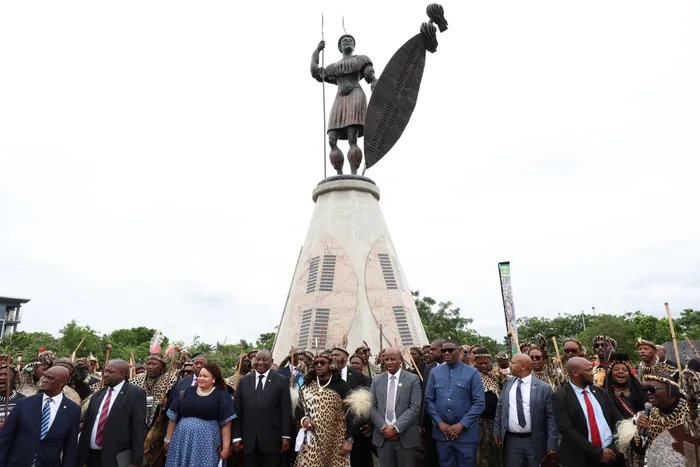Zulu royal family endorses national heritage site proposal for King Shaka's grave

The statue, honouring King Shaka's legacy, stands prominently at the airport entrance, yet his grave is not recognised as a national heritage site.
Image: File
The Zulu royal family has welcomed the Amafa Heritage Council's proposal to declare King Shaka kaSenzangakhona’s grave as a national heritage site.
Speaking on the sidelines of King Shaka’s Day commemoration in KwaDukuza sports field, north of Durban, on Wednesday, Amafa Heritage Council’s chief executive officer, Dr Mxolisi Dlamuka, said his office has compiled a document supporting the proposal and will soon submit it to the South African Heritage Resource Association for consideration.
Reacting to the proposal, the Zulu royal spokesperson Prince Thulani Zulu said the family was happy with the move, which he described as long overdue.
“We are happy to hear that Amafa will submit such a proposal to the national body. For us, as the royal family, this is long overdue. The Zulu nation is known today because of Ilembe (King Shaka),” said Zulu.
In further support of the proposal, Dlamuka said it has been Amafa’s vision that the grave should have been declared a national heritage site by 2028. The year will mark the bicentenary of King Shaka’s death.
He further highlighted that if his council succeeds in this endeavour, it will push for the grave to be declared a world heritage site, arguing that the Zulu nation is known worldwide because of Shaka’s vision of a united Southern Africa.
“Today, you find Zulu-speaking people in Malawi, Tanzania, Mozambique, Zimbabwe, and other Southern African countries because of King Shaka’s vision of a united Southern Africa, so why shouldn't such a visionary leader be recognised internationally?” Dlamuka asked.
He added that Shaka’s vision was akin to Napoleon Bonaparte, who envisioned one united Europe, saying even their time were coincidental.
Napoleon, a French ruler, was killed in 1815, and the following year, Shaka began his drive to unite Southern African tribes into a strong, formidable nation. He was killed in his KwaDukuza palace in 1828, and his grave is in the centre of the town, which was previously known as Stanger.
Speaking also during the commemoration, the Nazareth Baptist Church leader, Inkosi Mduduzi Shembe, called for the revival of Shaka’s palace, where his commemoration must be held, not in a sports field. This, too, was welcomed by the royal family.
The family dismissed Prince Simakade’s criticism of commemorating Shaka’s death. In his address on the day, Simakade, who is currently challenging King Misuzulu kaZwelithini’s ascension to the throne, had said it was unAfrican to celebrate or commemorate someone’s death as if it was a good thing.
Zulu said Simakade’s criticism was misplaced, saying the day is not a celebration of Shaka’s death but a gathering to remember him for building the Zulu kingdom.
willem.phungula@inl.co.za
Related Topics: